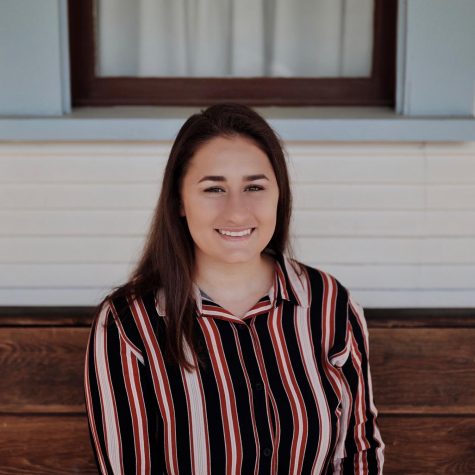This fall, San Diego State welcomed the newest addition to its collection of on-campus cultural centers. The Asian Pacific Islander Desi American Resource Center officially launched this August, with funding from last semester’s Instructionally-Related Fee increase.
Due to COVID-19 restrictions, the center currently operates virtually. Dr. Virginia Loh-Hagan, director of the APIDA Center, said even though this wasn’t the grand opening they imagined, they were still able to make it work.
“In some ways, there’s a bright side,” Loh-Hagan said. “It also gives us some time to be a little bit more thoughtful, so that when we are back together on campus and when we have our physical space, we’ll have plans.”
Loh-Hagan said she wants to create a safe environment where students feel a sense of connectedness around their shared identities.
“I see the APIDA Center as home,” Loh-Hagan said. “I want it to serve as a home base for the students and faculty and staff who identify as APIDA, and those who identify as allies too.”
Biology senior and (AAPI)phany Intern Belle Phommavong was involved with the development of the APIDA Center from the very beginning, and sees it as a way to unify all of the APIDA-identified organizations at SDSU.
“Being in a bunch of different organizations, it already really helps to have a central point where everyone can gather and share ideas so we won’t be as broken up on campus,” Phommavong said.
Loh-Hagan said she is still working on developing resources that will be offered in the near future. These include career services, academic support, mental health initiatives, peer mentorship programs and a residential learning community.
The APIDA Center is currently focusing on providing weekly workshops and guest speakers in celebration of Filipinx American History Month, which are especially relevant when considering the recent increase in racism against Asians as a result of the pandemic.
Last spring, Filipino cultural organization AB Samahan experienced a racist “zoombombing” incident during one of their election meetings.
“It was scary and very hurtful,” microbiology junior and AB Samahan Administrative Officer Daniella Luistro said. “It made me realize that I’m not always going to be sheltered under the model minority myth. It basically taught me that racism can happen to anyone.”
Loh-Hagan said incidents like these emphasize the importance for SDSU to have a center that provides a sense of belonging for the APIDA community.
The APIDA Center is currently focusing on providing weekly workshops and guest speakers in celebration of Filipinx American History Month, which are especially relevant when considering the recent increase in racism against Asians as a result of the pandemic.
Last spring, Filipino cultural organization AB Samahan experienced a racist “zoombombing” incident during one of their election meetings.
“It was scary and very hurtful,” microbiology junior and AB Samahan Administrative Officer Daniella Luistro said. “It made me realize that I’m not always going to be sheltered under the model minority myth. It basically taught me that racism can happen to anyone.”
Loh-Hagan said incidents like these emphasize the importance for SDSU to have a center that provides a sense of belonging for the APIDA community.
“I think that we are a powerful and important group, and we deserve to be heard,” Loh-Hagan said. “It’s a big deal to have the university support our community in this way. I think it says we matter and it says our voices matter.”
Loh-Hagan said the opening of the APIDA Center helps “dismantle these systems of inequity that have allowed the space for people to make comments that are hateful and ignorant.”
In response to the growing anti-Asian sentiment, the APIDA Center launched the “#RISEwithAPIDA” challenge. Participants are encouraged to show their solidarity by reading an APIDA-centered book, interviewing an APIDA-identified person, seeing an APIDA-centered movie or tv show and engaging with an APIDA-centered resource.
This newfound support is comforting to students like Luistro, who had trouble finding an Asian community during her first year at SDSU.
“With the opening of the APIDA Center it made me really happy and excited, because it helped me see that students like me, who were lost when they first came to SDSU, finally have a space where they can just settle down and find their own community,” Luistro said.
Child and family development freshman Maryhanna Leraas, found that getting involved with the APIDA Center helped ease her transition into college.
“I definitely think that the APIDA Center was my first sense of community, or sense of belonging at SDSU,” Leraas said. “As a freshman that was really, really important in helping my mental health, my sense of belonging, and just helping me feel welcomed to the school.”
Leraas ensures students the APIDA Center will accept anyone who comes their way.
“There are people that genuinely care, no matter who you are, no matter what you identify as,” Leraas said. “So I think if you’re feeling uncomfortable or are feeling unsure of yourself, know that there is a whole community and a half waiting behind you, ready to take you in their arms.”
Loh-Hagan encourages people to reach out and schedule a zoom meeting with her, so she can help them find support and resources to properly address their needs.
“No student should ever feel alone,” Loh-Hagan said. “Come to the APIDA center. We’ll take care of you.”
To get the most up-to-date information about resources and upcoming events, visit the APIDA Center’s Instagram and webpage.








